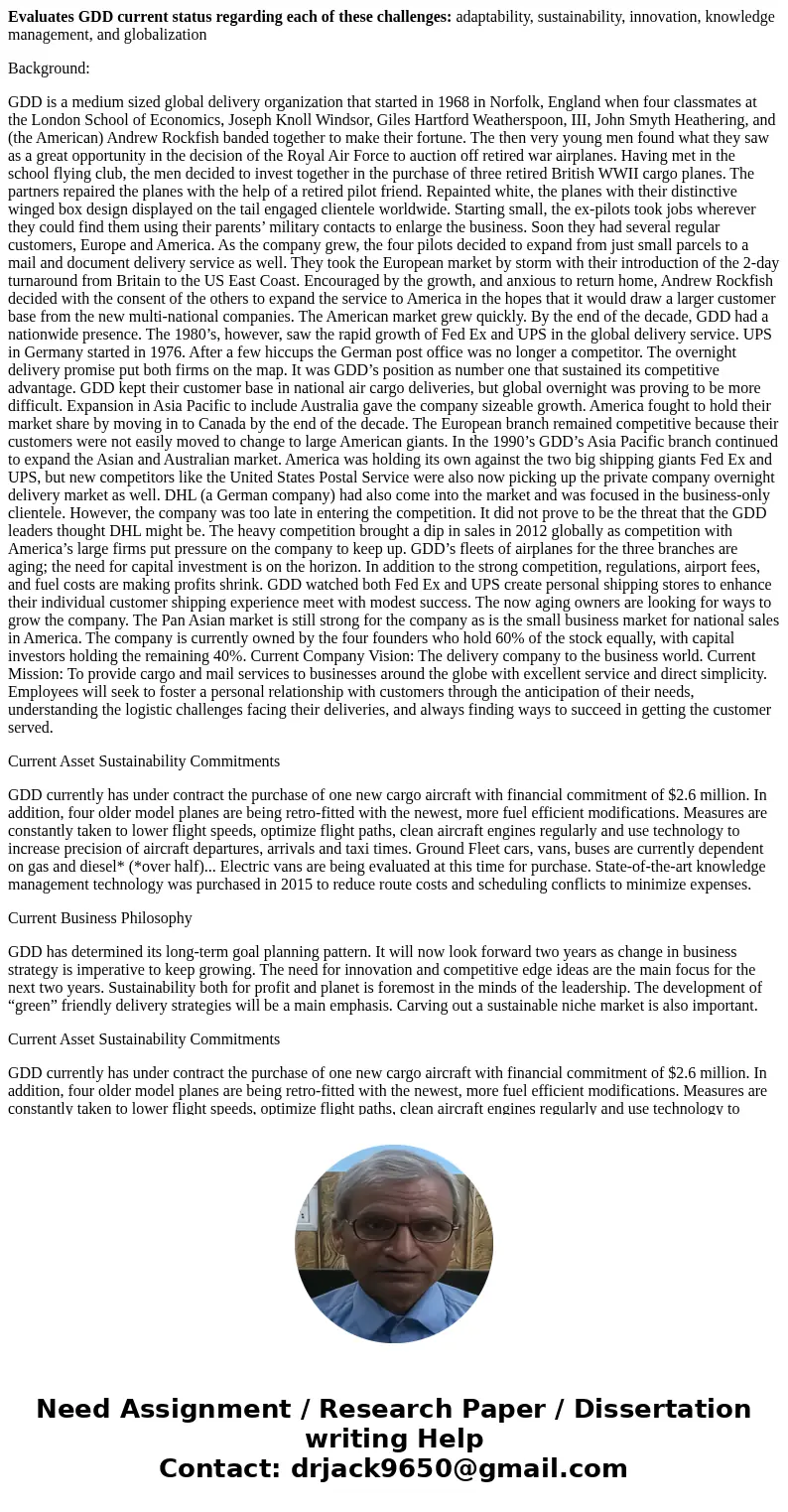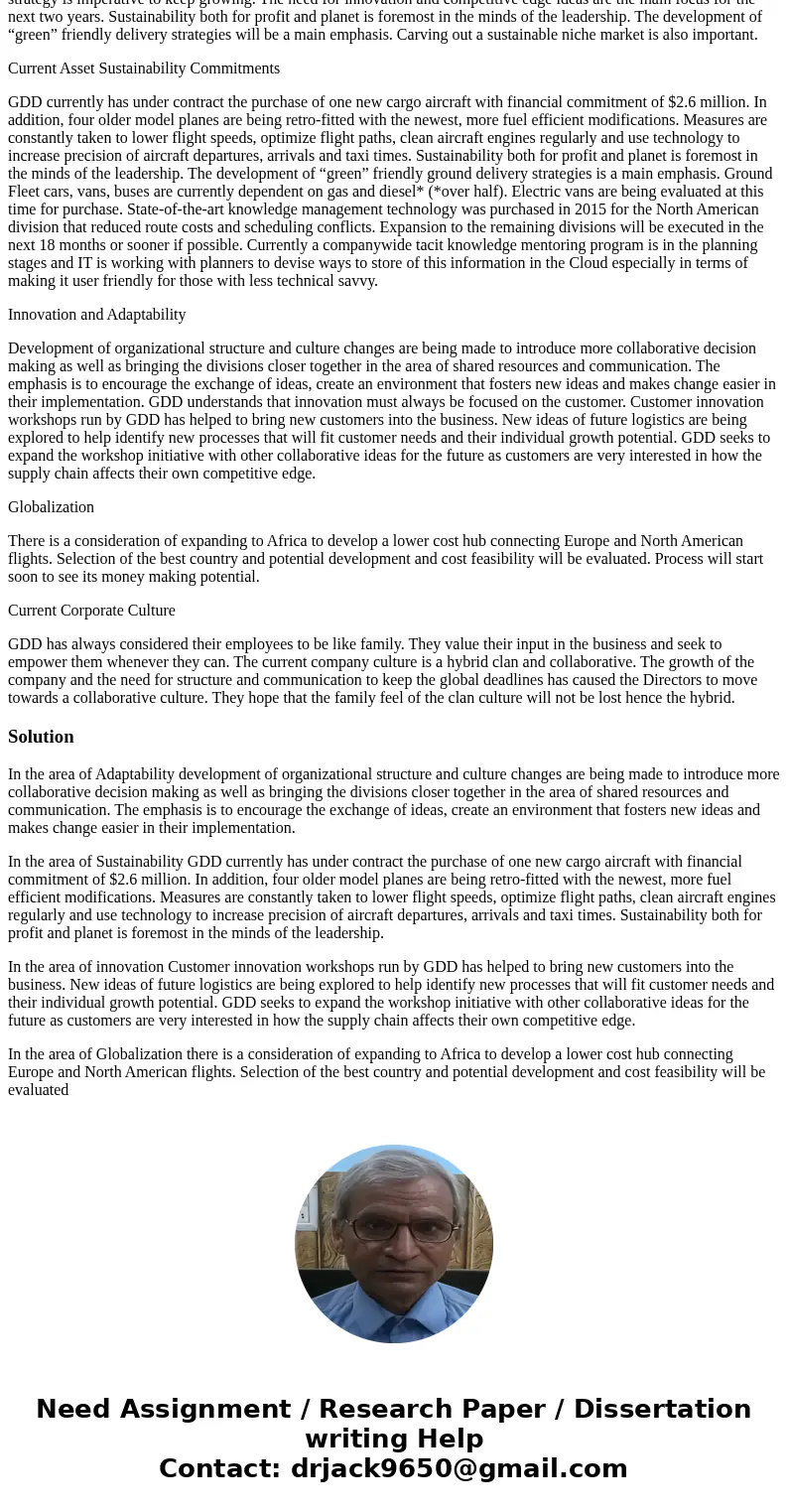Evaluates GDD current status regarding each of these challen
Evaluates GDD current status regarding each of these challenges: adaptability, sustainability, innovation, knowledge management, and globalization
Background:
GDD is a medium sized global delivery organization that started in 1968 in Norfolk, England when four classmates at the London School of Economics, Joseph Knoll Windsor, Giles Hartford Weatherspoon, III, John Smyth Heathering, and (the American) Andrew Rockfish banded together to make their fortune. The then very young men found what they saw as a great opportunity in the decision of the Royal Air Force to auction off retired war airplanes. Having met in the school flying club, the men decided to invest together in the purchase of three retired British WWII cargo planes. The partners repaired the planes with the help of a retired pilot friend. Repainted white, the planes with their distinctive winged box design displayed on the tail engaged clientele worldwide. Starting small, the ex-pilots took jobs wherever they could find them using their parents’ military contacts to enlarge the business. Soon they had several regular customers, Europe and America. As the company grew, the four pilots decided to expand from just small parcels to a mail and document delivery service as well. They took the European market by storm with their introduction of the 2-day turnaround from Britain to the US East Coast. Encouraged by the growth, and anxious to return home, Andrew Rockfish decided with the consent of the others to expand the service to America in the hopes that it would draw a larger customer base from the new multi-national companies. The American market grew quickly. By the end of the decade, GDD had a nationwide presence. The 1980’s, however, saw the rapid growth of Fed Ex and UPS in the global delivery service. UPS in Germany started in 1976. After a few hiccups the German post office was no longer a competitor. The overnight delivery promise put both firms on the map. It was GDD’s position as number one that sustained its competitive advantage. GDD kept their customer base in national air cargo deliveries, but global overnight was proving to be more difficult. Expansion in Asia Pacific to include Australia gave the company sizeable growth. America fought to hold their market share by moving in to Canada by the end of the decade. The European branch remained competitive because their customers were not easily moved to change to large American giants. In the 1990’s GDD’s Asia Pacific branch continued to expand the Asian and Australian market. America was holding its own against the two big shipping giants Fed Ex and UPS, but new competitors like the United States Postal Service were also now picking up the private company overnight delivery market as well. DHL (a German company) had also come into the market and was focused in the business-only clientele. However, the company was too late in entering the competition. It did not prove to be the threat that the GDD leaders thought DHL might be. The heavy competition brought a dip in sales in 2012 globally as competition with America’s large firms put pressure on the company to keep up. GDD’s fleets of airplanes for the three branches are aging; the need for capital investment is on the horizon. In addition to the strong competition, regulations, airport fees, and fuel costs are making profits shrink. GDD watched both Fed Ex and UPS create personal shipping stores to enhance their individual customer shipping experience meet with modest success. The now aging owners are looking for ways to grow the company. The Pan Asian market is still strong for the company as is the small business market for national sales in America. The company is currently owned by the four founders who hold 60% of the stock equally, with capital investors holding the remaining 40%. Current Company Vision: The delivery company to the business world. Current Mission: To provide cargo and mail services to businesses around the globe with excellent service and direct simplicity. Employees will seek to foster a personal relationship with customers through the anticipation of their needs, understanding the logistic challenges facing their deliveries, and always finding ways to succeed in getting the customer served.
Current Asset Sustainability Commitments
GDD currently has under contract the purchase of one new cargo aircraft with financial commitment of $2.6 million. In addition, four older model planes are being retro-fitted with the newest, more fuel efficient modifications. Measures are constantly taken to lower flight speeds, optimize flight paths, clean aircraft engines regularly and use technology to increase precision of aircraft departures, arrivals and taxi times. Ground Fleet cars, vans, buses are currently dependent on gas and diesel* (*over half)... Electric vans are being evaluated at this time for purchase. State-of-the-art knowledge management technology was purchased in 2015 to reduce route costs and scheduling conflicts to minimize expenses.
Current Business Philosophy
GDD has determined its long-term goal planning pattern. It will now look forward two years as change in business strategy is imperative to keep growing. The need for innovation and competitive edge ideas are the main focus for the next two years. Sustainability both for profit and planet is foremost in the minds of the leadership. The development of “green” friendly delivery strategies will be a main emphasis. Carving out a sustainable niche market is also important.
Current Asset Sustainability Commitments
GDD currently has under contract the purchase of one new cargo aircraft with financial commitment of $2.6 million. In addition, four older model planes are being retro-fitted with the newest, more fuel efficient modifications. Measures are constantly taken to lower flight speeds, optimize flight paths, clean aircraft engines regularly and use technology to increase precision of aircraft departures, arrivals and taxi times. Sustainability both for profit and planet is foremost in the minds of the leadership. The development of “green” friendly ground delivery strategies is a main emphasis. Ground Fleet cars, vans, buses are currently dependent on gas and diesel* (*over half). Electric vans are being evaluated at this time for purchase. State-of-the-art knowledge management technology was purchased in 2015 for the North American division that reduced route costs and scheduling conflicts. Expansion to the remaining divisions will be executed in the next 18 months or sooner if possible. Currently a companywide tacit knowledge mentoring program is in the planning stages and IT is working with planners to devise ways to store of this information in the Cloud especially in terms of making it user friendly for those with less technical savvy.
Innovation and Adaptability
Development of organizational structure and culture changes are being made to introduce more collaborative decision making as well as bringing the divisions closer together in the area of shared resources and communication. The emphasis is to encourage the exchange of ideas, create an environment that fosters new ideas and makes change easier in their implementation. GDD understands that innovation must always be focused on the customer. Customer innovation workshops run by GDD has helped to bring new customers into the business. New ideas of future logistics are being explored to help identify new processes that will fit customer needs and their individual growth potential. GDD seeks to expand the workshop initiative with other collaborative ideas for the future as customers are very interested in how the supply chain affects their own competitive edge.
Globalization
There is a consideration of expanding to Africa to develop a lower cost hub connecting Europe and North American flights. Selection of the best country and potential development and cost feasibility will be evaluated. Process will start soon to see its money making potential.
Current Corporate Culture
GDD has always considered their employees to be like family. They value their input in the business and seek to empower them whenever they can. The current company culture is a hybrid clan and collaborative. The growth of the company and the need for structure and communication to keep the global deadlines has caused the Directors to move towards a collaborative culture. They hope that the family feel of the clan culture will not be lost hence the hybrid.
Solution
In the area of Adaptability development of organizational structure and culture changes are being made to introduce more collaborative decision making as well as bringing the divisions closer together in the area of shared resources and communication. The emphasis is to encourage the exchange of ideas, create an environment that fosters new ideas and makes change easier in their implementation.
In the area of Sustainability GDD currently has under contract the purchase of one new cargo aircraft with financial commitment of $2.6 million. In addition, four older model planes are being retro-fitted with the newest, more fuel efficient modifications. Measures are constantly taken to lower flight speeds, optimize flight paths, clean aircraft engines regularly and use technology to increase precision of aircraft departures, arrivals and taxi times. Sustainability both for profit and planet is foremost in the minds of the leadership.
In the area of innovation Customer innovation workshops run by GDD has helped to bring new customers into the business. New ideas of future logistics are being explored to help identify new processes that will fit customer needs and their individual growth potential. GDD seeks to expand the workshop initiative with other collaborative ideas for the future as customers are very interested in how the supply chain affects their own competitive edge.
In the area of Globalization there is a consideration of expanding to Africa to develop a lower cost hub connecting Europe and North American flights. Selection of the best country and potential development and cost feasibility will be evaluated


 Homework Sourse
Homework Sourse